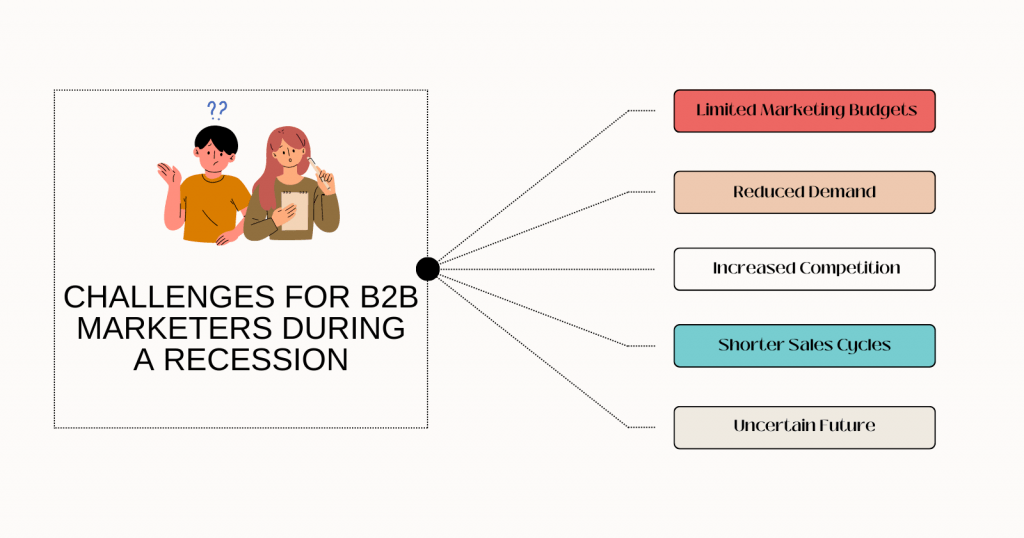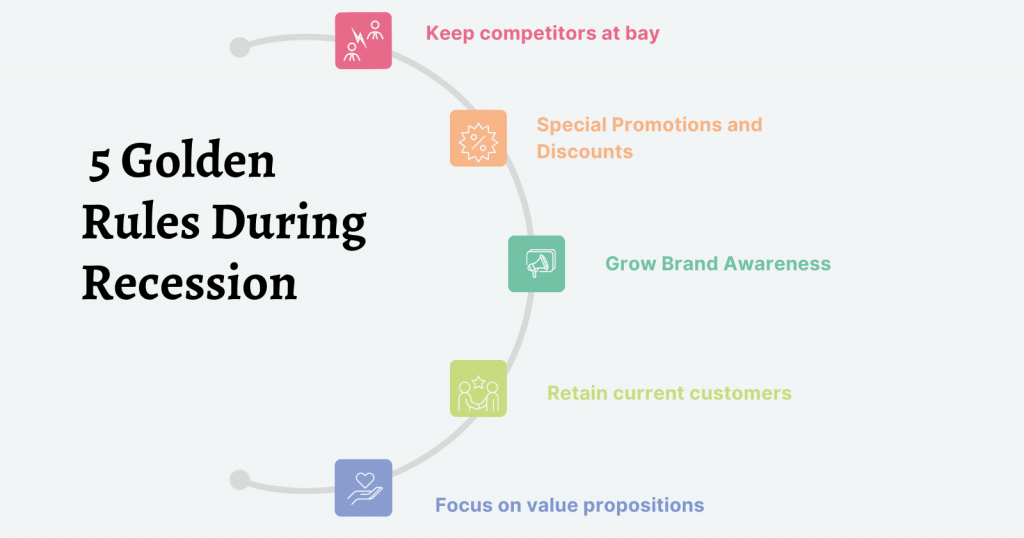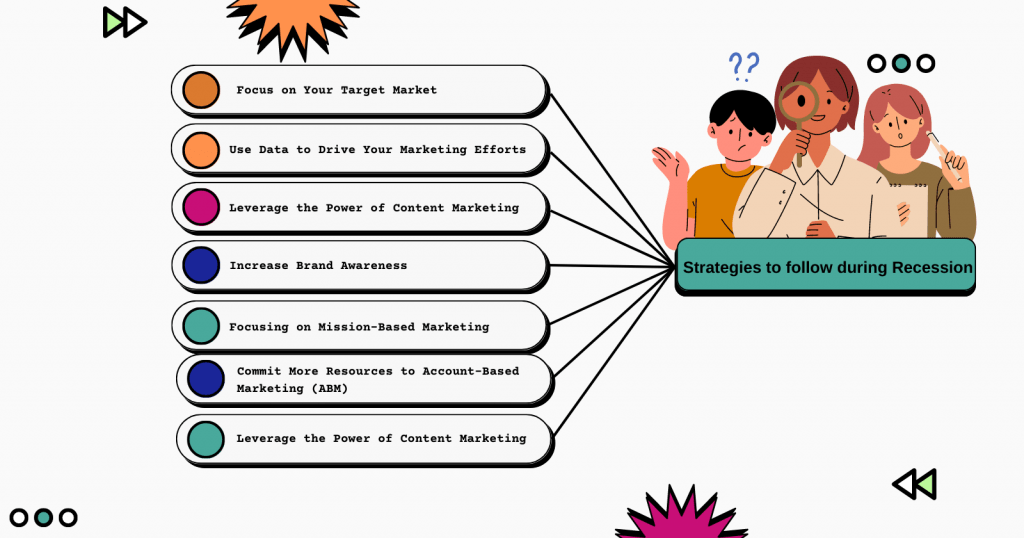B2B Marketing During Recession: How to Thrive In Tough Times

In times of economic uncertainty, B2B marketing can be a challenging endeavour. The global pandemic has left many businesses struggling to stay afloat, and the resulting recession has made it difficult for B2B companies to maintain their revenue streams. However, it’s not all doom and gloom for B2B marketers.
With the right strategies and tactics in place, B2B companies can not only survive but thrive during a recession.
In this blog post, we’ll explore the best practices for B2B marketing during a recession, from identifying new opportunities to optimising your marketing budget.
So, if you’re a B2B marketer looking to weather the storm of a recession, read on to discover how to position your business for success.
Challenges for B2B Marketers during a Recession

As the world grapples with the economic impact of the COVID-19 pandemic, businesses are facing unprecedented challenges. B2B marketers, in particular, are struggling to maintain their revenue streams and achieve their marketing goals.
Here are some of the most significant challenges that B2B marketers face during a recession:
1.1. Limited Marketing Budgets
With budgets being cut across the board, B2B marketers must do more with less. This means that they need to be more creative and strategic in their marketing efforts, focusing on channels and tactics that deliver the best ROI.
1.2. Reduced Demand
During a recession, demand for products and services is reduced as compared to the normal routine. B2B marketers must work harder to generate leads and convert them into customers.
1.3. Increased Competition
In a tough economy, businesses are competing more fiercely for every customer and every dollar. B2B marketers may change their brands and stand out from the competition to attract and retain customers.
1.4. Shorter Sales Cycles
With businesses looking to conserve cash, sales cycles tend to be shorter during a recession. B2B marketers must be nimble and responsive to close deals quickly.
1.5. Uncertain Future
During a recession, the future is uncertain, and businesses are hesitant to commit to long-term investments. B2B marketers must be flexible and adapt their strategies to the changing economic landscape.
B2B marketers face numerous challenges during a recession, from limited budgets to increased competition and uncertainty. However, by focusing on the right strategies and tactics, B2B marketers can overcome these challenges and position their businesses for success in the long term.
Bounce Back Stronger: 5 Golden Rules During Recession

When businesses face challenging times, it can be difficult to know where to start. However, there are some golden rules that can help companies to navigate through tough times and come out stronger on the other side.
Here are five golden rules for bouncing back during a recession:
2.1 Keep competitors at bay
During a recession, B2B companies must do everything possible to keep their competitors at bay. This means investing in marketing strategies that will keep their brand top-of-mind, such as targeted messaging and content marketing.
2.2 Special Promotions and Discounts
B2B companies can use several strategies to boost sales during a recession, such as offering special promotions or discounts, focusing on customer service, and providing high-quality products or services.
2.3 Grow Brand Awareness
B2B companies should focus on building brand awareness during a recession. This can be achieved through targeted messaging, content marketing, and social media campaigns that are designed to engage with customers and prospects.
2.4 Retain current customers
During a recession, retaining existing customers is more valuable than acquiring new ones as it is more cost-effective and can lead to increased loyalty and long-term revenue. This can be achieved by providing excellent customer service, offering promotions or discounts, and providing high-quality products or services.
2.5 Focus on value propositions
During a recession, B2B companies must focus on delivering value to their customers. This means offering products or services that provide a clear benefit to the customer and communicating this value effectively through targeted messaging and content marketing.
Win-Win Strategies B2B Marketers Must Follow During Recession

A recession-proof marketing strategy involves taking proactive steps to ensure that your business continues to thrive even during difficult economic times. Here are some practical win-win strategies to help you develop a robust B2B business:
1. Focus on Your Target Market
One of the key elements of a successful B2B marketing strategy is to understand your target market. By focusing on your ideal customer, you can tailor your marketing messages and strategies to resonate with their needs and pain points.
2. Use Data to Drive Your Marketing Efforts
In today’s data-driven world, it is essential to use data to inform your marketing efforts. By analyzing customer behavior and engagement metrics, you can gain valuable insights into what is working and what isn’t, and adjust your strategy accordingly.
3. Leverage the Power of Content Marketing
Content marketing is a powerful tool that can help you establish your brand as a thought leader in your industry. By creating high-quality, informative content, you can build trust with your target audience and establish a loyal following.
4. Increase Brand Awareness
Investing in brand-building initiatives can help businesses increase brand awareness, loyalty, and referrals. During a recession, customers are more likely to stick with brands they trust. Building a strong brand can help businesses build a loyal customer base and gain a competitive edge.
5. Focusing on Mission-Based Marketing
During a recession, businesses must prioritise mission-based marketing over nice-to-have campaigns. Mission-based marketing is a strategy that focuses on how a company’s products or services can help customers in challenging times.
It’s about conveying a sense of purpose and social responsibility to connect with customers on a deeper level. Turning off unnecessary or frivolous campaigns and focusing on mission-based marketing can help businesses build a stronger emotional connection with their customers.
6. Commit More Resources to Account-Based Marketing (ABM)
During a recession, businesses must focus on retaining their most valuable customers. Account-based marketing (ABM) is a strategy that targets key accounts with personalised marketing messages and offers.
It’s about building long-term relationships with customers and providing exceptional value. Committing more resources to ABM can help businesses retain their most valuable customers and maximise their lifetime value.
7. Leverage the Power of Content Marketing
Content marketing is a powerful tool that can help you establish your brand as a thought leader in your industry. Creating high-quality, informative content in the form of blogs/articles, case studies, reports, and analyses can build trust with your target audience and establish a loyal following.
By using the above strategies B2B business owners can grow their businesses even during a recession. If confused contact the De Digitizers team to give your B2B business the boost it needs.
Case Studies of Successful B2B Marketing During Recession
During previous economic downturns, many B2B companies have successfully navigated through the challenging times and even come out stronger on the other side. Here are a few examples of companies that implemented effective marketing strategies to stay afloat during a recession:
4.1 Salesforce
During financial crises, Salesforce.com has generally demonstrated resilience and the ability to adapt to changing market conditions.
During the Great Recession of 2008-2009, Salesforce took an innovative approach to the market by launching a “No Software” campaign. The campaign highlighted the cost savings and flexibility of cloud-based software, which was particularly appealing to companies that were looking to reduce their IT budgets. The campaign was a huge success, helping Salesforce to weather the recession and emerge as a leader in the CRM software market.
Here are some facts and figures that explain how Salesforce survived during the 2008 recession:
- Despite the 2008 recession, Salesforce grew its revenue by 44% to $1.077 billion.
- When the recession hit in 2008, Salesforce was in a strong financial position, with over $300 million in revenue and more than 40,000 customers.
- Despite the economic downturn, Salesforce continued to grow during the recession, with revenue increasing by 44% in 2009.
- Salesforce’s success during the recession was due in part to the fact that its cloud-based model offered customers a more affordable and flexible alternative to traditional software.
- Salesforce also benefited from its focus on the enterprise market, which tends to be less affected by economic downturns than the consumer market.
- Additionally, Salesforce invested heavily in research and development during the recession, which helped it to innovate and stay ahead of its competitors.
- Salesforce’s CEO, Marc Benioff, also took a proactive approach to manage the company during the recession, implementing cost-cutting measures and focusing on customer retention.
4.2 IBM
During the 2008-2009 recession, IBM experienced a decline in its hardware sales, which was a significant portion of its revenue. In response, the company focused on shifting its focus to software and services, which were higher-margin businesses. Here are some statistics, facts, and figures that demonstrate IBM’s successful diversification during the recession:
- In 2008, IBM’s hardware sales declined by 21% compared to the previous year, while its software sales increased by 5% and its services sales increased by 10%.
- Despite the decline in hardware sales, IBM’s overall revenue increased by 5% in 2008, thanks to the growth in its software and services businesses.
- IBM’s net income also increased during the recession, from $10.4 billion in 2007 to $12.3 billion in 2008, and then to $13.4 billion in 2009.
- IBM’s gross margin increased from 41.3% in 2007 to 45.7% in 2009, driven by the higher margins in its software and services businesses.
- By 2010, IBM’s software and services businesses accounted for more than 80% of its revenue, while its hardware business accounted for less than 20%.
Overall, IBM’s successful diversification during the 2008-2009 recession demonstrates the importance of adapting to changing market conditions and focusing on higher-margin businesses to maintain revenue and profitability.
4.3 Hubspot
While the COVID-19 pandemic caused many businesses to struggle, HubSpot responded by offering free resources to help their customers weather the storm. Here are some statistics, facts, and figures that illustrate HubSpot’s response:
- In March 2020, HubSpot launched a remote work toolkit, which included a free version of their CRM software and other tools to help businesses adjust to the shift to remote work.
- HubSpot also offered free access to their online courses and certifications to help people learn new skills and improve their job prospects during the pandemic.
- By July 2020, more than 70,000 businesses had signed up for HubSpot’s free CRM, and the company had seen a 50% increase in sign-ups for their paid software.
- In Q2 2020, HubSpot’s revenue increased by 21% compared to the previous year, and the company added 9,000 new customers during the quarter.
- In addition to offering free resources, HubSpot also made a $30 million commitment to support its partners and customers during the pandemic.
- HubSpot’s CEO, Brian Halligan, was named one of the top CEOs of 2020 by Glassdoor, in part due to his leadership during the pandemic.
Overall, HubSpot’s response to the COVID-19 pandemic, including offering free resources to businesses, helped the company to build brand awareness and strengthen its relationships with customers. The company’s revenue and customer base both grew during the pandemic, and its CEO was recognized for his leadership during a difficult time.
Conclusion
In conclusion, while a recession may seem like a daunting challenge for B2B marketers, it also presents an opportunity to stand out from the competition and create long-lasting customer relationships.
- Building trust, delivering value, and leveraging new technologies are key to thriving in tough economic times.
- Agility, adaptability, and customer focus are important to weathering a recession.
- The right mindset and approach can help B2B marketers emerge stronger from a recession.
- B2B marketers should keep the customer at the center of every decision.
- A recession can be an opportunity to create a brighter future for businesses and their customers.
- By embracing the challenge and using the right approach, B2B marketers can not only survive but thrive during tough economic times.
Survive In Tough Time
Ready to thrive in tough times?
Contact De Digitizers for innovative digital solutions that will help your B2B marketing strategy stand out and succeed.





















